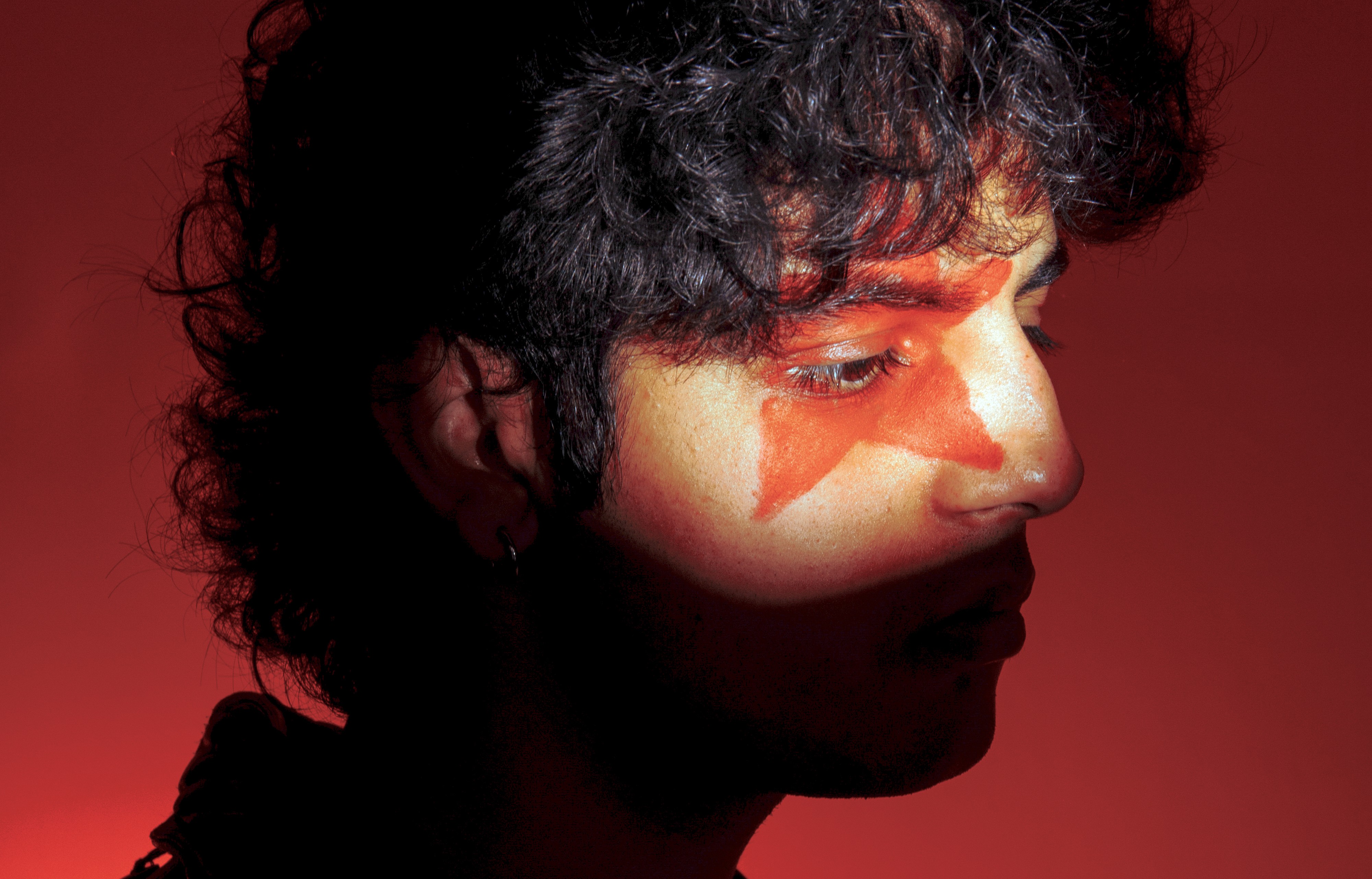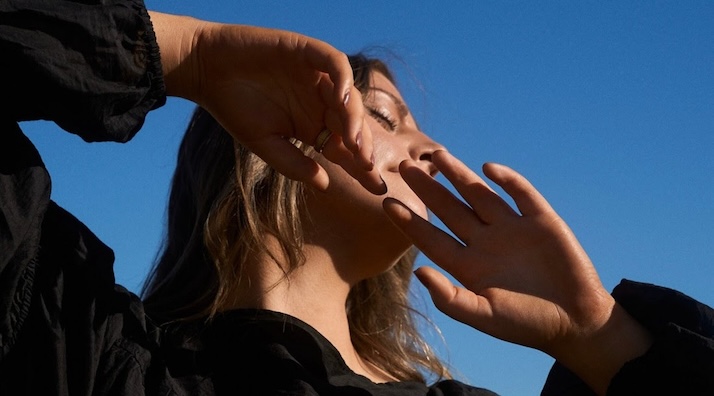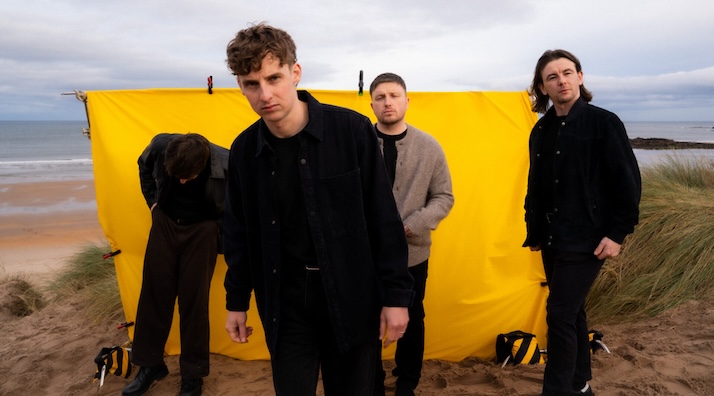For Curtis Waters, Music Is the One Thing That Makes Him Feel Alive [Q&A]

Photo: Callum Walker Hutchinson
A brave recount of surviving the abyss of mental health and rebuilding an immigrant life coupled with the staunch reminder that he’s made an absurd amount of money and looks fly in Fenty gloss, Curtis Waters’ BAD SON is a deeply cathartic and radically hopeful sonic and visual journey.
Crafting a full project after receiving a platinum plaque for the viral track “Stunnin’” is more of a burden than one may realize, surviving the weight of needing to follow up your best work yet with your best work yet. This is especially true for a 20-something-year-old from Nepal in the midst of figuring out who he is not only as an artist but as a curious and ever-evolving being.
Pouring ten years into a piece of work that completely strips him naked, BAD SON is an organ outside of Waters’ body. In that same breath, its public release is permission to amputate any attachment he’s had with his suffering, rewriting the narratives he’s healed through. From blame to acceptance, seeing your parents as their complexities and life happening for you rather than to you, BAD SON is a piece of art that lingers after an initial listen. It’s a shattered mirror staring back at all of us, calling into question what we may not have been yet brave enough to confront.
We caught up with Waters ahead of the release of BAD SON and talked through the anxieties, excitement, despair, and radiant joy of the album’s release.
Ones To Watch: First off, where are your emotions? How are you feeling?
It’s weird man I’m confused, I don’t even know. I don’t think it’s hitting me yet, maybe I’m anxious maybe I’m excited. I’ve been working on this project so long, I think I know what it is but I don’t know if people will understand or if it’s gonna be too much. Let’s see.
I love that you’re comfortable enough to be all those emotions at once. Amidst the anxiety, what does taking care of yourself look like right now?
I think saying “no” has been very important. I’ve been thinking a lot about society and capitalism and how we feel guilty for enjoying life. But when you look back at life, it’s like, do you have enough money to eat food, do you spend time with your family and community? That’s what life is. We’re taught to be in this endless cycle of expansion and ego and growth; I definitely fall into it and I think that’s a lot about what this album is. I handed it in, I moved back home to North Carolina, there’s work to do but I’m like, let me swim in a river with my girlfriend for once. Let me spend time with my brother. There’s more to life than being somebody.
What does life being enjoyed look like?
I’ve been really excited about learning with no regard for making money. No purpose but to learn. I’ll just have a question like, “Were prophets back in the day just people with schizophrenia?” I think it’s so cool that we have the internet. To just be able to look up like “What was it like to be a child in the Aztec period?” It has nothing to do with my work or music, I just want to learn how to make a video game, I want to learn everything. When you take away information as a way to commodify it, I think it’s so cool. Just to learn for the sake of learning. It’s been very good for my mental health lately.
We don’t let learning be unconditional the way that we did when we were kids. What do you think your inner child thinks about your life right now?
So proud. Every day I think that I am living in this bizarre dream I had as a kid. I went back home and I never really cried but there are moments when I’ll be listening to the music I made and think “I never thought I’d get this far.” There are moments where I feel ungrateful or where I’m like “This person is on tour with this big artist” or when the politics and numbers get you. But I make music, I’m honest, and I can be whoever I want. Somehow I’m able to make money from it and that’s such an incredible blessing. All my friends sort of moved on to real life and I never felt like I got a job. I just kept being delusional and it’s still working.
Very Sagittarius of you. So now that it’s finally coming out, how does it feel for the world to hear this project?
I’m such a perfectionist and find myself to be pretty insecure. I’ve had this idea for this album since I was 14 and I’ve scrapped, changed things. I’m excited to be 50 years old and listen to how this album was authentic to me. At this point in my life, I’m trying to detach myself from external validation and just do something for myself. I think this album is something I can be really proud of and excited to show my kids. No matter what happens, I think I did the right thing.
Detaching from external validation is the secret to peace I think.
You just can’t control it. The first song that blew up was “Stunnin’,” and I thought that song was stupid, I was never going to drop it, and it went on to change my life. Sometimes I’ll make a song where I’m like “This is the one that’s going to do it,” but you really have no idea. I’m done trying to predict it.
Do you think you had to come into this way of self-validation because of the fact that “Stunnin’” went so viral and you felt you had to uphold that hype?
Yeah, that was a really big anxiety for a long time. I think that’s why it took so long for this album, too. I didn’t know which direction to follow. There was this big guilt inside of me because my family grew up not extremely financially well-off, so I saw this as an opportunity to support my family by playing the game and making songs I didn’t necessarily love but felt like was the common denominator that people could buy into. But then there was this other part that was like “No, you have to be authentic, fuck the money and do what you want to do.” That was the biggest battle for a long time. I’m a bit of a pessimist sometimes and I know this album is great but if down the road I have to go get a job, fuck it, I’ll go get a job. But I can’t compromise on the music because it’s the one thing that makes me want to be alive.
Being an artist so raw and bare, especially about mental health, were there cultural stigmas you had to work through being from Nepal?
It’s very lonely. Community is odd because it’s supportive but there’s also these rules and regulations. When I came up with BAD SON, I was dealing with being bipolar and always felt like I didn’t belong or couldn’t be authentic. And of course, there are certain prejudices and stuff, but I’ve had to come to terms with the fact that people may not understand, my family may not understand, but art was the one thing I could always go to. It’s bad to think about other people when you’re making art— it should be selfish, cathartic, and specific. There are moments when I’m like “What’s my mom or the Nepali people going to think of this?” and then I start making something that’s inauthentic. These are thoughts that we all feel, though. I have this song “Inner Child,” and it’s about my parents and the distance I feel with my dad. I felt self-conscious about putting it out there, but it’s not rare. We all have these deep, conflicting emotions with our families. Empathetic and messy.
I think you confronting it out loud allows people to do it for themselves as well.
Yeah, when I was 14 or 15 I was like “Man, my parents don’t understand me, I’m depressed, blah blah blah.” But I think that’s not the right perspective. When you get older you’re like “Oh, my dad also had a dad and he wasn’t able to live up to his dad’s expectations either.” And he projects that onto me, but maybe I’ll project it onto my brother or my son. Working on this album, the feeling I came to was empathy rather than alienation.
So Ian Curtis and Frank Ocean inspired your name. What do those artists mean to you and how do they inform how you stand in your artistry?
When I was a kid, I was really struggling with my mental health. I gravitated towards artists like Ian Curtis and Daniel Johnston, outsider artists. It wasn’t just music to me, it was life. When I saw people that struggled being authentic, it gave me hope. I was also romanticizing tragedy I think.
And lastly, since you’re only seeking internal validation, how do you feel about BAD SON?
I’m really proud. It’s an honest piece of work and even its parts that are more lighthearted and satirical are parts of my personality. Like right now we’re being all philosophical, but I also go out and drink and have fun. It’s all part of it. I feel proud. Making this album made me grow up. I had this idea and I knew what it needed to be, but a lot of times it wasn’t just making music. I had to come live in LA. I had to go to Canada. I had to go through relationships. I had to deal with mortality. Art isn’t created in a vacuum. It’s given me purpose to wake up and say “Life is so scary, but at least I can put it somewhere.”
Curis Waters' BAD SON is available now.


![Pop Star Seanna Pereira Has Entered the Conversation [Q&A]](https://s3-us-west-2.amazonaws.com/onestowatch-v2/a003_c005_251211_l6.mxf.12_33_49_20._still002-_i_p_h_o_n_e-1771968603.jpg)
